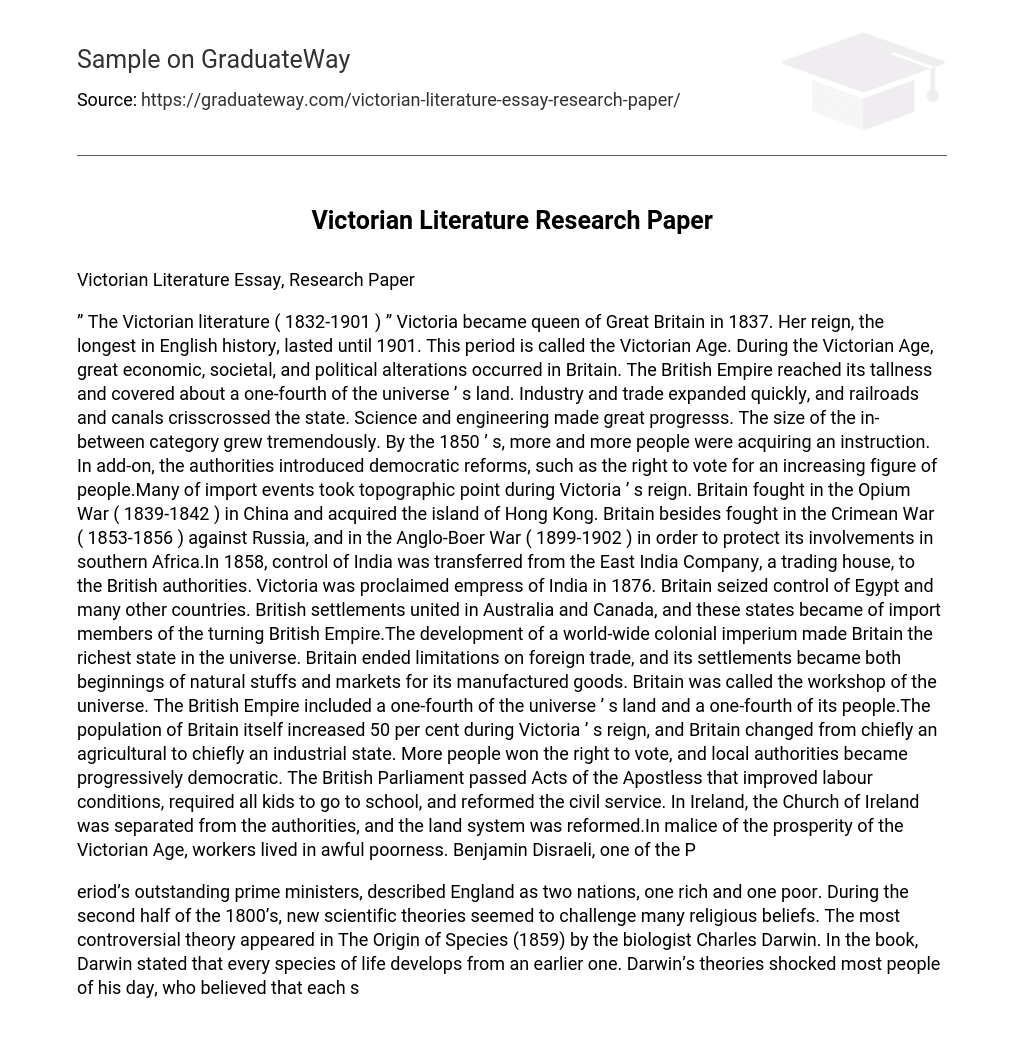Victorian Literature Essay, Research Paper
” The Victorian literature ( 1832-1901 ) ” Victoria became queen of Great Britain in 1837. Her reign, the longest in English history, lasted until 1901. This period is called the Victorian Age. During the Victorian Age, great economic, societal, and political alterations occurred in Britain. The British Empire reached its tallness and covered about a one-fourth of the universe ’ s land. Industry and trade expanded quickly, and railroads and canals crisscrossed the state. Science and engineering made great progresss. The size of the in-between category grew tremendously. By the 1850 ’ s, more and more people were acquiring an instruction. In add-on, the authorities introduced democratic reforms, such as the right to vote for an increasing figure of people.Many of import events took topographic point during Victoria ’ s reign. Britain fought in the Opium War ( 1839-1842 ) in China and acquired the island of Hong Kong. Britain besides fought in the Crimean War ( 1853-1856 ) against Russia, and in the Anglo-Boer War ( 1899-1902 ) in order to protect its involvements in southern Africa.In 1858, control of India was transferred from the East India Company, a trading house, to the British authorities. Victoria was proclaimed empress of India in 1876. Britain seized control of Egypt and many other countries. British settlements united in Australia and Canada, and these states became of import members of the turning British Empire.The development of a world-wide colonial imperium made Britain the richest state in the universe. Britain ended limitations on foreign trade, and its settlements became both beginnings of natural stuffs and markets for its manufactured goods. Britain was called the workshop of the universe. The British Empire included a one-fourth of the universe ’ s land and a one-fourth of its people.The population of Britain itself increased 50 per cent during Victoria ’ s reign, and Britain changed from chiefly an agricultural to chiefly an industrial state. More people won the right to vote, and local authorities became progressively democratic. The British Parliament passed Acts of the Apostless that improved labour conditions, required all kids to go to school, and reformed the civil service. In Ireland, the Church of Ireland was separated from the authorities, and the land system was reformed.In malice of the prosperity of the Victorian Age, workers lived in awful poorness. Benjamin Disraeli, one of the P
eriod’s outstanding prime ministers, described England as two nations, one rich and one poor. During the second half of the 1800’s, new scientific theories seemed to challenge many religious beliefs. The most controversial theory appeared in The Origin of Species (1859) by the biologist Charles Darwin. In the book, Darwin stated that every species of life develops from an earlier one. Darwin’s theories shocked most people of his day, who believed that each species had been created by a separate divine act. His book, which is usually called simply The Origin of Species, presented facts that refuted this belief. It caused a revolution in biological science and greatly affected religious thought. Darwin thus seemed to contradict the Biblical account of the creation of life. The theories of Darwin and other scientists led many people to feel that traditional values could no longer guide their lives. Victorian writers dealt with the contrast between the prosperity of the middle and upper classes and the wretched condition of the poor. In the late 1800’s, they also analysed the loss of faith in traditional values.Several writers wrote nonfiction that dealt with what they believed to be the ills of the time. For example, Thomas Carlyle attacked the greed and hypocrisy he saw in society in Sartor Resartus (1833-1834). John Stuart Mill discussed the relationship between society and the individual in his long essay On Liberty (1859).Later Victorian literature. During the late 1800’s, a pessimistic tone appeared in much Victorian poetry and prose. Tennyson considered the intellectual and religious problems of the time in his long poem In Memoriam (1850). Matthew Arnold described his doubts about modern life in such short poems as “The Scholar-Gypsy” (1853) and “Dover Beach” (1867). Arnold’s most important literary achievements are his critical essays on culture, literature, religion, and society. Many of his essays were collected in Culture and Anarchy (1869).Queen Victoria reigned over an immense British Empire, and much English literature expresses the experience of Imperialism, from one point of view or another. Perhaps the finest imperialist writer of the late 1800’s and early 1900’s was Rudyard Kipling. He was a prolific writer of prose and poetry, and he was enormously popular. Kipling was the first English writer to be awarded the Nobel Prize for literature, in 1907.





